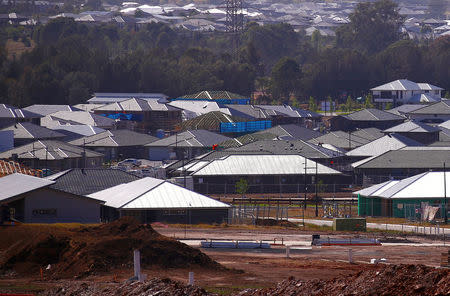Australian regulator warns 'debt is easy to get into, hard to pay back'
By Swati Pandey
SYDNEY (Reuters) - Australia's banking watchdog warned against sky-rocketing household debt on Tuesday, urging banks to further improve lending standards as well as their understanding of borrowers' spending patterns.
Australia's property sector has been a key focus for regulators who, this year, forced banks to tighten the screws on lending to speculative property investors.
And while the restrictions seem to be bearing fruit with house prices easing in the past couple of months, particularly in Sydney, they still remain strong overall.
That means the Australian Prudential Regulation Authority (APRA) will need to concentrate resources on mortgage lending issues into next year, Chairman Wayne Byres said in a speech in Sydney.
"It is easy to run up debt, but far harder to pay it back down when circumstances change," Byres said, while acknowledging the regulator has been "more interventionist than we would normally wish to be".
APRA is worried about a debt-fuelled binge in the property market that could end in tears if prices correct sharply, while the Reserve Bank of Australia (RBA) is fretting over the spending power of debt-laden households.
On Tuesday, the RBA released the minutes of its November policy meeting which showed it harboured deep concerns about Australia's record-high household debt to income ratio of 190 percent.
Sluggish wage growth of just 2 percent has weighed on consumer spending and price pressure across the economy, meaning cash rates are set to be kept at 1.5 percent for a long time to come.
LENDING STANDARDS
Byres expressed discomfort about the overall rate of non-performing housing loans drifting higher towards levels seen just after the 2008 global financial crisis, although there is no sign of an economic downturn at present.
While lending standards have improved, following stringent oversight by APRA in recent months, Byres said more prudence was warranted.
"A reasonable proportion of new borrowers have limited surplus funds each month to cover unanticipated expenses, or put aside as savings," he said.
"We have also observed only a slight moderation in the proportion of borrowers being granted loans that represent more than six times their income," Byres added.
As a rule of thumb, a loan-to-income ratio of six times will require a borrower to commit 50 percent of their net income to repayments, if interest rates returned to their long term average of a little more than 7 percent.
Mortgage rates for owner-occupier loans presently range between 3.5-5.5 percent.
"High loan-to-income lending in Australia is well north of what has been permitted in other jurisdictions grappling with high house prices and low interest rates, such as the UK and Ireland," Byron added.
He said he expected the industry to collect "realistic" living expense estimates from borrowers, and to develop and use benchmarks to ensure appropriate lending.
NON-BANK LENDING
APRA was also aware, he said, of more home loans flowing through the non-bank sector as the country's major banks tightened their lending standards and raised rates on interest-only loans.
APRA will soon have greater powers over the non-bank sector if new legislation before parliament is enacted. But Byres said the regulator will not take on a supervisory role, telling those who felt uncomfortable at the thought of APRA supervising non-banking institutions "let me assure you the feeling is mutual".
"We are not seeking to expand our supervisory remit and, beyond collecting information that allows us to track aggregate trends in lending activity, we will not be undertaking any supervision of individual lenders."
(Reporting by Swati Pandey; Editing by Eric Meijer)

 Yahoo Finance
Yahoo Finance 

